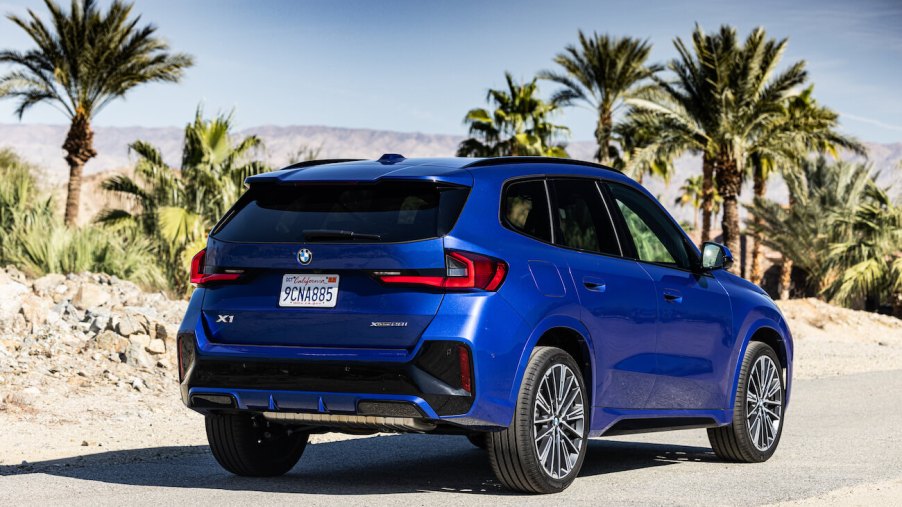
3 Pros and 3 Cons of the Cheapest New BMW SUV for 2023
BMW has a well-earned reputation for being expensive, but some of its vehicles are still affordable, especially for a luxury vehicle. The BMW X1 is one example of this. It’s currently the cheapest BMW SUV in the brand’s lineup. Is it worth buying, though, or should you be shopping around for another luxury SUV or a non-luxury vehicle with similar specs?
Pro: The BMW X1 is affordable
Many BMW models can easily cost over $100,000, especially if you add all the optional features. The X1 isn’t like that. The xDrive28i, which is the X1’s base trim, costs only $39,000.
This is a typical price for other luxury SUVs. The 2023 Jaguar E-Pace starts at $49,500, which is over $10,000 more. It’s also the only one that costs significantly more than the X1 for the base trim.
What further increases the affordable factor is the basic warranty. Most warranties are for three years or 36,000 miles, whichever comes first. For the BMW X1, new owners will get four years or 50,000 miles.
Pro: A luxurious interior for a premium BMW SUV
Even though the 2023 BMW X1 is small, it has plenty of room. There is a toggle-switch shift lever, a floating center console, an all-digital dashboard, and designer elements such as textured speaker grilles.
The seats are comfortable, thanks to the perforated SensaTec upholstery. There is also a leather-wrapped sport steering wheel and multi-color adjustable ambient lighting that can create a relaxed environment.
Pro: Lots of standard features
A few years ago, BMW was slammed for trying to make heated seats a subscription-based service. Since then, BMW has been more generous with its standard features.
There is plenty of tech, like a 10.7-inch touchscreen, Apple CarPlay, Android Auto, USB audio connect, and hands-free Bluetooth.
All-wheel drive comes standard as well. While the X1 isn’t your typical off-road vehicle, the AWD feature does make light trails feasible.
Con: Fuel economy is typical for a BMW SUV
The fuel economy isn’t all that bad, as the BMW X1 gets 25 mpg city, 34 mpg highway, and 28 mpg combined. If you compare it to much larger vehicles, then this is stellar. The X1 is a subcompact SUV, however, and given the size, the fuel mileage could certainly be better.
Con: Non-luxury models have similar performance for a cheaper price
The 2023 BMW X1 is equipped with a 241 hp 2.0-liter TwinPower Turbo inline four-cylinder engine, and it can go from 0 to 60 mph in 6.2 seconds. That’s impressive enough, but there are some non-luxury competitors that are cheaper and offer specs that are close to what the X1 has.
The Mazda CX5 is one such SUV. The Turbo trim starts at $38,225 and offers a 2.5-liter engine with 227 hp. It can go from 0 to 60 mph in 6.2 seconds as well.
Con: The upper trim is costly
There are only two trims for the 2023 X1. The most expensive is the X1 M35i, and the other is the xDrive28i, which only adds all-wheel drive to the standard sDrive28i.
Usually, the price increases slowly over a wider range of trims, but this is not the case with the X1. It jumps straight from $39,100 to $49,900. This is a massive price hike of $10,800.
With all this information, it may seem hard to decide on whether you want the 2023 BMW X1 after all. There’s no doubt it’s a decent vehicle, and it’s also the most affordable BMW SUV on the market. Unless you simply can’t live without a luxury vehicle, however, you may come out better in the long run by buying a non-luxury model like the Mazda CX-5.


